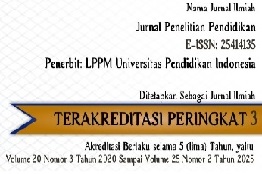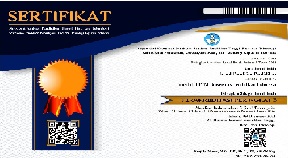The Influence of Educational Qualifications and Educational Competence on the Quality of Learning Services in Segregation Education in DKI Jakarta
Abstract
This study aims to examine and analyze the effect of educational qualifications and pedagogical competence on the quality of learning services because the proportion of non-specialized teachers still dominates segregation-based schools. The research method used in this study is a quantitative descriptive method with survey techniques. While the data analysis technique used to answer the research hypothesis is a statistical model of path analysis (path analysis). The population and at the same time being the respondents in this study were 133 SLB teachers spread across 14 special schools in DKI Jakarta. The technical analysis data used to test the hypothesis is simple regression analysis with multiple regression, t test and F test. The results show that 1) there is an effect of educational qualifications on the quality of learning services in segregated education in DKI Jakarta of 44.32%, which means that the two variables go hand in hand, the higher and linear the qualifications of teacher education, the better the quality of learning services produced. 2) There is an influence of pedagogic competence on the quality of learning services in segregated education in DKI Jakarta of 43.80%, meaning that the more teachers improve their pedagogical competence, the higher the effect on the quality of learning services produced. 3) There is an effect of educational qualifications and pedagogical competence on the quality of learning services in segregated education in DKI Jakarta of 45.23%, the two variables of educational qualifications and pedagogical competence go hand in hand with the quality of learning services, which means that the higher and linear the educational qualifications and pedagogic competence, the better the quality of learning services produced by the teacher. The results of testing the main hypothesis in this study can be concluded that educational qualifications and pedagogic competence have a positive and significant effect on the quality of learning services in segregation education in DKI Jakarta.
Keywords
Full Text:
PDFReferences
Abdullah, S. (2013). Inovasi Pembelajaran. Jakarta: Bumi Aksara.
Chalofsky, N. F. (2014). Handbook of Huma Resource Development. New Jersey: John Wiley & Sons,Inc.
Chomaidi, & Salamah. (2018). Pendidikan dan Pengajaran: Strategi Pembelajaran Sekolah. Jakarta: PT Grasindo.
Fasli, J. (2010). Reformasi Pendidikan Dalam Konteks Otonomi Daerah. Yogyakarta: Adicita Karya Nusantara.
Febrianti, E. (2017). Deskripsi Kompetensi Pedagogik dan Profesional Guru yang Berlatar Belakang Pendidikan Non PLB (Studi Kasus di SDLB Maarif Kowen, Timbulharjo, Sewon, Bantul). Jurnal Al Tanzim, 88-94.
Haikal, R. M., & Darmiani, H. (2022). Problematika Guru dalam Mengajar Peserta Didik Berkebutuhan Khusus di SLB Azahra. Jurnal Ilmiah Profesi Pendidikan, 643-648.
Hastuti, M. B. (2017). Analisis Kompetensi Pedagogik Guru Non PLB di SLB Negeri Pembina Jakarta. Al Tanzim, 43-47.
Haryati, & Rochman. (2012). Peningkatkan Kualitas Pembelajaran Pendidikan Kewarganegaraan Melalui Praktik Belajar Kewarganegaraan (Project Citizen). Jurnal Ilmiah CIVIS, Volume II, No. 2, 24-27.
Hernawaty , S. (2006). What Makes Effective Teaching in the 21st Century. 1st English Language and Literature International Conference (ELLiC), 145-151.
Huberman, A.M, M. H., & Saldana, J. (2014). Qualitative Data Analysis, A Methods Sourcebook, Edition 3. USA: Sage Publications. Terjemahan Tjetjep Rohindi Rohidi. Universitas Indonesia Press, 128-134
Komang, A. (2012). Manajemen Sumber Daya Manusia. Yogyakarta: Graha Ilmu.
Mangkunegara , A. P. (2015). Kecerdasan Emosi, Stres Kerja dan Kinerja Guru SLB. Jurnal Kependidikan : Penelitian Inovasi Pembelajaran, Volume 45, Nomor 02, 142-155.
Ramdhani, A., Amin, A.S. & Ramdhani, M.A. (2014). Writing a Literature Review Research paper: A Step-by-step Approach. http://www.researchgate.net/publication/311735510
Sudjana, N. (2017). Penilaian Hasil Proses Belajar Mengajar. Bandung : Remaja Rosdakarya.
Sakir, M. (2012). Konsep Pengembangan Mutu Pendidikan Berbasis Madrasah. Cendekia Vol.10 No.1, 64-67.
Scachter, J. (2009). Teacher Performance-Based Accountability:Why, What and How. Journal International, 354-362.Sugiyono. (2012). Memahami Penelitian Kualitatif. Bandung: Alfabeta.
Sundayana, R. (2013). Media Pembelajaran Matematika. Bandung. Bandung: Alfabeta.
Supriono, A. (2017). Pengaruh Kompetensi Pedagogik, Profesional, Dan Motivasi Kerja Terhadap Kinerja Guru Sekolah Dasar. Jurnal Pendidikan, Volume 18, Nomor 2 September, 1-12.
Suryobroto, B. (2010). Proses Belajar Mengajar di Sekolah. Jakarta: PT Rineka Cipta.
Syahabuddin. (2021). Peningkatan Kemampuan Guru Dalam Pengembangan Materi Bahan Ajar Melalui Supervisi Akademik Kepala Sekolah Di SLB Negeri Taliwang Kab. Sumbawa Barat Tahun Pelajaran 2018-2019. JURNAL KEPENDIDIKAN,Vol 6, No 1, Agustus, 65-76.
Tentawa, F. (2016). The Roles Of Teachers’ Work Motivation And Teachers’ Job Satisfaction In The Organizational Commitment In Extraordinary Schools. International Journal of Evaluation and Research in Education (IJERE) ,Vol.5, No.1, March, 39-45.
DOI: https://doi.org/10.17509/jpp.v23i2.60778
Refbacks
- There are currently no refbacks.
Copyright (c) 2023 Jurnal Penelitian Pendidikan


